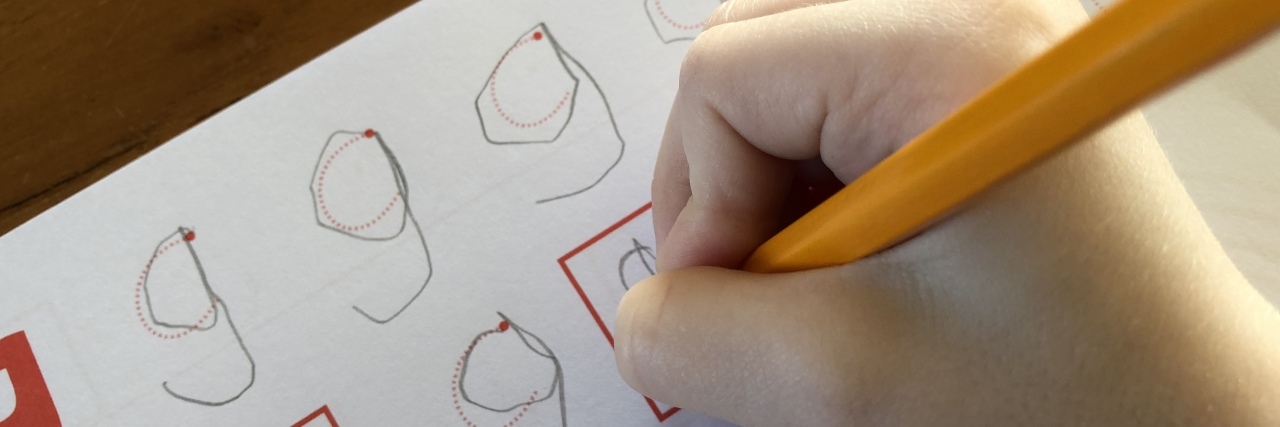From the time I was a young child, I struggled with my handwriting. Much of the difficulty is due to my learning disability and limited hand dexterity. I can remember feeling the shame and stigma of poor handwriting in elementary school. In first grade, I received a W indicating weakness on my report card for my handwriting. I was diagnosed the previous year as having a learning disability and had an Individual Education Plan.
My teachers and peers tried every intervention. I cried my way through the Handwriting Without Tears curriculum, and my penmanship did not improve. I had a peer work with me on writing my name on a slate with chalk at recess. I made little improvement. In second grade when cursive was introduced, I became more frustrated. I learned to sign a crude version of my name and did not master every letter of the cursive alphabet.
My peers would look at my handwriting and say that I was messy. I have also been told I have the handwriting of a serial killer. My teacher was complaining about my handwriting. A guy in my class said, “If you want to be a writer, you’re going to have to be neat.” My teacher then said, “Judging by your handwriting, I can see how your room probably looks.” She was correct that my room was messy, but that was an issue of organization, not handwriting.
I was also compared to people who had nice penmanship. “Just look at how neatly he makes his letters!” The handwriting was impressive, but no matter how hard I tried, mine never improved. Despite my struggles with handwriting, I enjoyed writing stories and poems. I wasn’t going to let bad handwriting get in the way of expressing myself.
Learning how to type in high school was a struggle with my hand dexterity. The standard course of study for typing is one semester. It took me a full year to learn how to type and it was well worth it. If I typed assignments, the teacher did not have to decipher my handwriting. I was able to get my ideas out without the shame of how bad my printing looked.
The stigma did not end when I graduated from high school. I often had my mom scribe for me on job applications. She has beautiful handwriting. Many jobs would see my handwriting and think I couldn’t do the job. They viewed me as lazy or sloppy based on my penmanship. I have also had jobs when I was hired but my employer did not understand why my handwriting was not neat. I was told things such as “neatness counts” and “your handwriting is unique.”
Despite my struggles with handwriting, I am not against schools teaching handwriting. I do think that it is important to know how letters are formed. I also think you need to learn how to sign your name. I had to sign so many papers when we bought our home. But I’m fighting against the stigma that a person who has poor handwriting is lazy, sloppy, not trying or less than others.
My difficulties with handwriting involve dysgraphia. Dysgraphia is a brain-based disorder that affects fine motor skills that are necessary to write legibly. Dysgraphia can also affect the ability to spell correctly. In children, it often accompanies other learning disabilities or attention deficit disorder. Adults can develop dysgraphia after a brain injury. My grandpa had a stroke and it affected his handwriting. He had beautiful handwriting prior to the stroke and struggled to write his name afterward. Treatment for dysgraphia involves the use of graph paper, pencil grips and teaching typing early. It is important not to criticize the handwriting of a person with dysgraphia. The person is trying their best to write and has little control over the signals their brain is giving to their hands.
I still struggle with handwriting today. Oftentimes the students I work with cannot read my handwriting. Sometimes I struggle to read my own. Thankfully, the student who told me that I had to be neat to be a writer was wrong. I have been published and all of my writing submissions have been typed. I use tools such as spell check and grammar check. My husband is also the greatest editor. My handwriting may not be the neatest, but I no longer feel shame about it. I have not let it stop me from doing what I wanted to do.
Getty image by cmspic.

